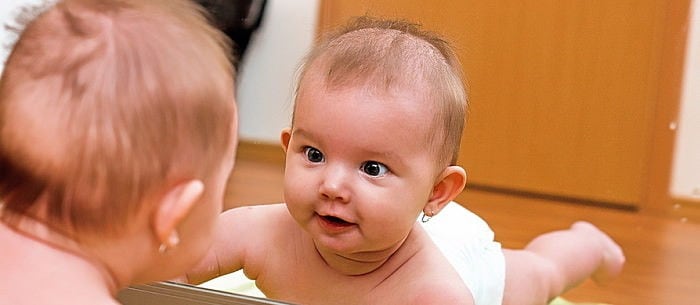Laughing at her own reflection, smiling when you smile and fussing when she’s dropped a toy — your baby at 4 months is so different from a newborn. Very special moments and milestones are being reached as your 4-month-old baby starts to recognize mirror images, respond to expressions of emotion and enjoy social play.
According to the American Academy of Pediatrics, social development for your baby at 4 to 7 months is all about making emotional connections, so start off by getting in tune with your little one. Does she like music and moving objects? Is she more physical with her emotions, and does she like to touch your face? Learn your baby’s natural tendencies, and plan playtime accordingly.
And read
our guide to developmental milestones for kids
.
Milestones Between 47 Months
At this age, your baby will start to enjoy interacting with others. “Enjoying social play is arguably the most important milestone,” says Corinna Bittle, a board-certified behavior analyst and owner of bitKIDS Behaviour Consulting. “Showing interest in others and social engagement is a huge part of child development and is what we are looking for when conducting any type of assessment. Showing interest in others socially is an important indicator that development is typical.” You’ll find that your baby at 4 months is much more interactive and curious than your newborn was, and this is where the fun begins.
Between 4 and 7 months, your baby is beginning to vocalize her needs. For example, she will become upset when she drops a toy and can’t reach it again, and she wants you to get it. “Remember that your baby is a blooming social person,” says Sara Bingham, founder of WeeHands baby sign language program. “If your baby wants something or would like your attention, she is going to vocalize it at this point in time, quietly and then more loudly. Respond to them gently and quickly when you can before your baby gets frustrated.” If you can’t address your baby’s needs (for example, if she is frustrated because you won’t allow her to keep throwing her food), redirect her attention with a toy or a book.
Your little one is also becoming more aware of her surroundings. At this age, she will enjoy looking at herself in a baby-safe mirror, according to the Centers for Disease Control and Prevention, though it doesn’t have anything to do with vanity. Your baby won’t develop self-recognition until around 20 months of age — right now, that pretty face in the mirror is just a playmate she can babble and laugh with.
Your baby is also learning social cues from your expressions and mood. “Imitation is important at this time, and you may see some simple vocal and facial expression imitation,” Bittle says. “The imitation piece is another indicator of social connection and is an important tool that will be needed for other social, language and play skills.” Your baby is able to recognize your emotions, so a happy baby starts with a happy you!
How to Help Your Baby Develop
There are many things you can do with your baby to support her social development. “Just like with every stage, be present, enjoy the moments and take the time to engage with your child,” Bittle says. “Babies love when we chat with them. Laugh with them and let them know you think their sounds are powerful.” Be sure to interact with them on their level. Though you won’t understand the conversation, this gives your little one a chance to learn how to act around others.
You can also help your baby learn how to interact with others. “At this age, babies are starting to look at things and will call your attention to items of interest — this is called shared or joint attention,” Bingham says. “Acknowledge and build on the social behaviors she is using by showing her signs that are appropriate for the situation.” Pay attention to what she is trying to show you, and respond in a polite way.
Keep a journal handy, take lots of photos and even start an email address for your baby so you can share with them all the silly, funny and amazing things they are doing at this time. After all, they only stay little for so long.
For more on milestones, check out this Overview of 4 to 7 Month Milestones.
Shannon Moyer-Szemenyei is a certified birth and postpartum doula. She is the mother of two children, Owen (4 years old) and Graeme (6 months), and she blogs at Sweet Stella’s, writing about pregnancy, parenting, setting a positive example and living mindfully.






